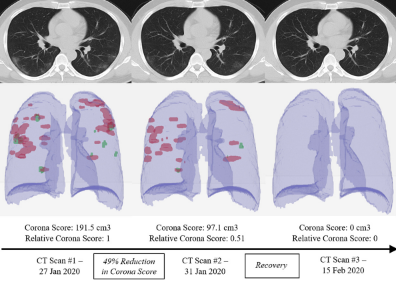
An artificial intelligence-based system can accurately detect COVID-19 using thoracic CT scans in patients with respiratory symptoms, according to a preprint study published on arXiv.org. The system can also help monitor patients with the disease. Other teams have employed AI to speed diagnosis and develop clarity on the signature appearance of the disease in the lungs of symptomatic patients.

“Our research found that the CT image analysis algorithm – developed from multiple international datasets – was able to differentiate 157 patients with and without COVID-19 with a 0.996 AUC (plus, 98.2% sensitivity and 92.2% specificity),” said Hayit Greenspan, chief science officer and co-founder of Radlogics Inc., which is co-headquartered in Boston and Tel Aviv.
The system was initially trained on the Imagenet database and then validated on using cases from Chinese hospitals.
“Since we submitted the study for publication two weeks ago, we have processed hundreds of patient cases in China, Russia and Italy, and we are seeing similar results in performance,” she told BioWorld.
The Radlogics’ platform can process up to one million CT studies per day, and it is being rapidly scaled up in other countries to meet demand.
That speed may be critical to an increasing number of hospitals dealing with an exponentially rising number of coronavirus patients, particularly in areas that continue to experience testing bottlenecks that delay positive identification of infectious patients.
Rapid and accurate evaluation of CT scans could exclude negative cases.
“This would allow a greater volume of patients being screened for coronavirus, with earlier and more rapid detection of positive cases, which could lead to more effective identification and containment of early cases," the authors noted.
Researchers and physicians have found that those scans have a number of signature features, which the AI system can quickly detect. The researchers are also looking for new features that may indicate coronavirus or disease progression.
“Beyond the main features of the peripheral ground glass opacity in the lower lobes, we are now seeing and exploring additional texture and layout characteristics,” Greenspan said. “We are actively exploring the larger data sets that are now coming to Radlogics from all over the world from our installations at different hospitals.”
“When deployed at scale with AWS or another cloud-capable platform, the algorithm is designed to integrate within minutes into a comprehensive, seamless, and secure workflow to augment acute care teams with deep clinical insight and actionable data in seconds,” Greenspan said.
As a fully automated process, the system “eliminates the bottleneck of availability of large numbers of radiologists allowing automatic screening and would help the reduction of human errors, which are inevitable in large scale operations under time pressure,” she noted.
To streamline monitoring and care of patients, “we can also provide a COVID-19 score that give the doctors a sense of the seriousness of the illness, thus allowing them to triage the patients based on those that urgently need intensive care such as ventilator support.” The system also creates a “heat map” and a 3D volume display of opacities in the lung.
“On the scaling front, we have actively engaged major OEM distribution partners, and hope to have distribution agreements in place soon that will enable more rapid deployment of our solution,” Greenspan noted.
Two other companies, London-based Behold.ai Ltd. and Wellbeing Software, are looking to gain approval to use AI analysis of X-rays for coronavirus detection from the U.K.’s National Health System.
Their system would combine Behold’s AI-based Red Dot algorithm with Wellbeing’s Radiology Information System, which is installed in more than 700 locations in the U.K.
The goal is to enable a large cadre of hospitals to quickly interpret chest X-rays so they can effectively triage COVID-19 patients. X-rays have become one of the primary diagnostic tools for the coronavirus in the U.K., said Chris Yeowart, director at Wellbeing.
“We are able to prioritize abnormal chest X-rays with greater than 90% accuracy and a 30-second turnaround. If that were translated into busy hospitals coping with COVID-19, the benefits to health care systems are potentially enormous,” said Simon Rasalingham, Behold’s chairman and CEO.